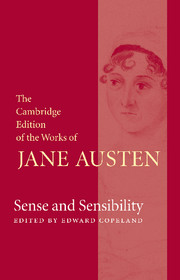Book contents
- Frontmatter
- Contents
- General Editor’s Preface
- Acknowledgements
- Chronology
- Introduction
- Note on the text
- Miscellaneous Frontmatter
- Sense and Sensibility: Volume I
- Sense and Sensibility: Volume II
- Sense and Sensibility: Volume III
- Corrections and Emendations to 1813 Text
- List of Abbreviations
- Explanatory Notes
Chapter 11
Published online by Cambridge University Press: 19 December 2020
- Frontmatter
- Contents
- General Editor’s Preface
- Acknowledgements
- Chronology
- Introduction
- Note on the text
- Miscellaneous Frontmatter
- Sense and Sensibility: Volume I
- Sense and Sensibility: Volume II
- Sense and Sensibility: Volume III
- Corrections and Emendations to 1813 Text
- List of Abbreviations
- Explanatory Notes
Summary
MRS. DASHWOOD did not hear unmoved the vindication of her former favourite. She rejoiced in his being cleared from some part of his imputed guilt;—she was sorry for him;— she wished him happy. But the feelings of the past could not be recalled.—Nothing could restore him with a faith unbroken—a character unblemished, to Marianne. Nothing could do away the knowledge of what the latter had suffered through his means, nor remove the guilt of his conduct towards Eliza. Nothing could replace him, therefore, in her former esteem, nor injure the interests of Colonel Brandon.
Had Mrs. Dashwood, like her daughter, heard Willoughby's story from himself—had she witnessed his distress, and been under the influence of his countenance and his manner, it is probable that her compassion would have been greater. But it was neither in Elinor's power, nor in her wish, to rouse such feelings in another, by her retailed explanation, as had at first been called forth in herself. Reflection had given calmness to her judgment, and sobered her own opinion of Willoughby's deserts;—she wished, therefore, to declare only the simple truth, and lay open such facts as were really due to his character, without any embellishment of tenderness to lead the fancy astray.
In the evening, when they were all three together, Marianne began voluntarily to speak of him again;—but that it was not without an effort, the restless, unquiet thoughtfulness in which she had been for some time previously sitting—her rising colour, as she spoke—and her unsteady voice, plainly shewed.
“I wish to assure you both,” said she, “that I see every thing—as you can desire me to do.”
Mrs. Dashwood would have interrupted her instantly with soothing tenderness, had not Elinor, who really wished to hear her sister's unbiassed opinion, by an eager sign, engaged her silence. Marianne slowly continued—
“It is a great relief to me—what Elinor told me this morning—I have nowheard exactly what I wished to hear.”— For some moments her voice was lost; but recovering herself, she added, and with greater calmness than before—“I am now perfectly satisfied, I wish for no change.
- Type
- Chapter
- Information
- Sense and Sensibility , pp. 395 - 403Publisher: Cambridge University PressPrint publication year: 2006

